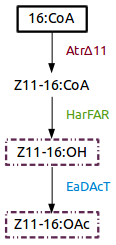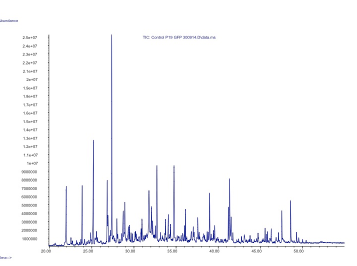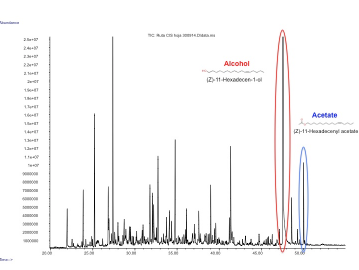Difference between revisions of "Part:BBa K1554001"
(→Usage and Biology) |
|||
| Line 10: | Line 10: | ||
acyl-CoA + reduced acceptor + O2 = Delta11-acyl-CoA + acceptor + 2 H2O | acyl-CoA + reduced acceptor + O2 = Delta11-acyl-CoA + acceptor + 2 H2O | ||
| − | + | ||
| + | [https://parts.igem.org/Part:BBa_K1554001 Part:BBa_K1554001] (AtrΔ11), [https://parts.igem.org/Part:BBa_K1554002 Part:BBa_K1554002] (HarFAR) and [https://parts.igem.org/Part:BBa_K1554003 Part:BBa_K1554003] (EaDAcT) are enzymes of a biosynthesis pathway that lead to the production of insect sexual pheromones, Z11-16:OH and Z11-16:OAc, using palmitate as substrate. | ||
| + | |||
| + | |||
| + | [[File:VUPV_pathway.png]] | ||
| + | |||
| + | Figure 1. Insect sexual pheromone pathway for ''Nicotiana benthamiana''. | ||
| + | |||
| + | In our project we made a device with these three pheromones and expressed them by transient expression it in our plant chasis, ''Nicotiana benthamiana''. In order to check if the insect sexual pheromones were present, we performed the analysis using HS-SPME coupled to GC-MS. We observed to additional peaks in the transformed plants that were not present in the control and have a similar mass spectrum and retention time as the standards, which confirmed that both molecules were the desired pheromones, (Z)-11-hexadecen-1-ol and (Z)-11-hexadecenyl acetate. | ||
| + | |||
| + | [[File:UPV_rutas-biosintesis_feromonas.png]] | ||
| + | |||
| + | Figure 2. GC-MS analysis of the volatile organic compounds from a negative control of ''Nicotiana benthamiana''. | ||
| + | |||
| + | [[File:VUPV_pheromone.png]] | ||
| + | |||
| + | Figure 3. GC-MS analysis of the volatile organic compounds from a genetically engineered ''Nicotiana benthamiana'' to produce insect pheromones. | ||
| + | |||
<span class='h3bb'>Sequence and Features</span> | <span class='h3bb'>Sequence and Features</span> | ||
Revision as of 23:38, 15 October 2014
AtrΔ11
The AtrΔ11 protein is a delta-11-desaturase from Amyelois transitella that introduces an unsaturation between C11 and C12 in long-chain fatty acids.
Usage and Biology
The AtrΔ11 protein is a delta 11 desaturase coming from Amyelois transitella which introduces a desaturation in fatty acids at the 11th bond.
acyl-CoA + reduced acceptor + O2 = Delta11-acyl-CoA + acceptor + 2 H2O
Part:BBa_K1554001 (AtrΔ11), Part:BBa_K1554002 (HarFAR) and Part:BBa_K1554003 (EaDAcT) are enzymes of a biosynthesis pathway that lead to the production of insect sexual pheromones, Z11-16:OH and Z11-16:OAc, using palmitate as substrate.
Figure 1. Insect sexual pheromone pathway for Nicotiana benthamiana.
In our project we made a device with these three pheromones and expressed them by transient expression it in our plant chasis, Nicotiana benthamiana. In order to check if the insect sexual pheromones were present, we performed the analysis using HS-SPME coupled to GC-MS. We observed to additional peaks in the transformed plants that were not present in the control and have a similar mass spectrum and retention time as the standards, which confirmed that both molecules were the desired pheromones, (Z)-11-hexadecen-1-ol and (Z)-11-hexadecenyl acetate.
Figure 2. GC-MS analysis of the volatile organic compounds from a negative control of Nicotiana benthamiana.
Figure 3. GC-MS analysis of the volatile organic compounds from a genetically engineered Nicotiana benthamiana to produce insect pheromones.
Sequence and Features
- 10COMPATIBLE WITH RFC[10]
- 12COMPATIBLE WITH RFC[12]
- 21COMPATIBLE WITH RFC[21]
- 23COMPATIBLE WITH RFC[23]
- 25COMPATIBLE WITH RFC[25]
- 1000COMPATIBLE WITH RFC[1000]



